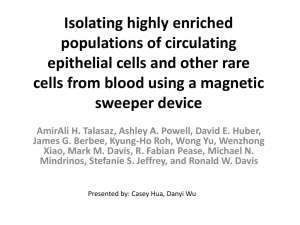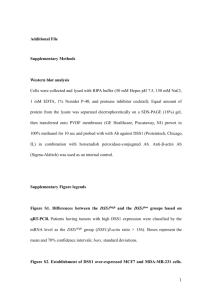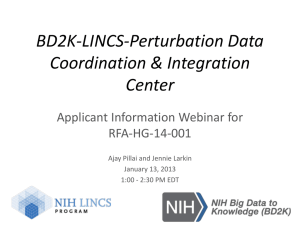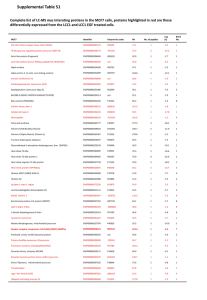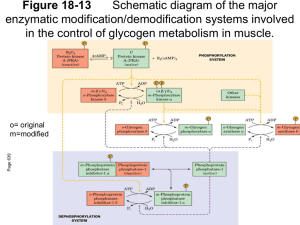PPT - NIH LINCS Program
advertisement
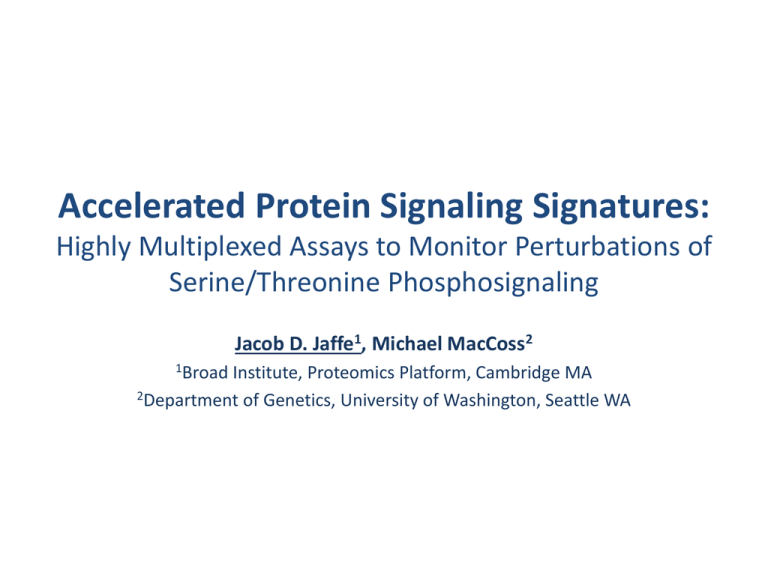
Accelerated Protein Signaling Signatures: Highly Multiplexed Assays to Monitor Perturbations of Serine/Threonine Phosphosignaling Jacob D. Jaffe1, Michael MacCoss2 1Broad Institute, Proteomics Platform, Cambridge MA 2Department of Genetics, University of Washington, Seattle WA Phospho-signaling q Gene Expression • q is large (hopefully) • Phospho-signaling is inaccessible through expression profiling • Phospho-signaling can be acute or sustained Phosphoproteomics: current developments Phosphosite.org database (CST) Non-redundant sites: 97,222 Non-redundant proteins: 13,384 Sites curated from literature: 94,031 Sites using site-specific (SS) methods: 10,006 Sites using only discoverymode MS (MS) methods: 86,378 Sites using both SS and MS methods: 4,773 • There are a lot of phosphosites! ( > # genes) • How can we study these systematically? Interrogation of extant CMAP Data ATP-competitive kinase inhibitors Perturbations staurosporine:MCF7 sanguinarine:MCF7 sanguinarine:HL60 cardiovascular agents PPAR agonists PO4 • No DNA/RNA involved • Kinases and phosphatases are the key regulators • Therefore, perturbagens that modulate kinase/phosphatase expression or activity should have effects on phosphosignaling Kinase/phosphatase genes TK inhibitors tyrphostin AG1478:MCF7 tyrphostin AG825:MCF7 gefitinib:HL60 imatinib:MCF7 imatinib:PC3 digitoxigenin:HL60 digitoxigenin:MCF7 digitoxigenin:PC3 digoxigenin:HL60 digoxigenin:MCF7 digoxin:HL60 digoxin:MCF7 helveticoside:HL60 helveticoside:MCF7 helveticoside:PC3 lanatoside C:HL60 lanatoside C:MCF7 HDAC Inhibitors trichostatin A:PC3 trichostatin A:MCF7 valproic acid:MCF7 valproic acid:HL60 valproic acid:PC3 valproic acid:ssMCF7 valproic acid:SKMEL5 Step 1: Discovery and learning 2.8x ↑ Digest Control Tx ‘Light’ Cells Tx 1 Fractionate ‘Medium’ Cells Tx 2 ‘Heavy’ Cells Mix Phosphopeptide Enrichment 2.4x ↓ Mass Spectrometry • Cells are colored by isotopic labels (i.e., 13C, 15N, but not radioactive) • Generic technology enriches all phosphopeptides • However, most phosphosites are Ser or Thr and NOT Tyr • Ser/Thr phosphorylation is low hanging fruit • Mass Spec provides both identification AND quantification We propose to do for phosphosignaling what the Broad LINCS group has done for gene expression A. Cell Lines/Conditions B. Example Coherent Cluster 5 C. Select Representative Member(s) Cluster avg. 4 log2 fold change Phosphosites Phosposites 3 Expert Criteria 2 1 0 -1 -2 -3 -4 -5 Conditions • Natural synergy between projects • Exploit existing robust methods FNHM(pS)QQGPR LLWIDA(pT)AGGNK ... Signal Step 2: Equivalent of L1000 – the “P100” Assay time • • • • • Use synthetic peptide internal standards for better quantification and proof of ID LOD/LOQ /copies per cell When you want to guarantee you measure it each and every time! Next-gen instruments will make this even more selective May enable us to skip phosphopeptide enrichment altogether What should we see? Protein Copy #/cell 1,000 1,000 1,000 10,000 10,000 10,000 100,000 100,000 100,000 Phosphorylation Stoichiometry 1% 10% 50% 1% 10% 50% 1% 10% 50% # cells req to see phospho (250 amol) 1.51E+07 1.51E+06 3.01E+05 1.51E+06 1.51E+05 3.01E+04 1.51E+05 1.51E+04 3.01E+03 # cells req to see protein (250 amol) 1.51E+05 1.51E+05 1.51E+05 1.51E+04 1.51E+04 1.51E+04 1.51E+03 1.51E+03 1.51E+03 • Assays will be constructed such that we will always monitor the phospho- and nonphospho-states of the site as well as a different peptide to serve a surrogate for total protein levels. End result • ~100-plex phosphosite MRM-MS assay – 60-90 minutes/sample – $100-200/sample • Reduced representation suitable for signature generation • Requirements compatible will low cell numbers or tissue samples • Absolute stoichiometry on every site, every time Step 3: Standardize and Disseminate LINCS Repository Other public databases LINCS Member Labs • Standard software platform (MacCoss Lab, U. Wash.) • Cross-laboratory reproducibility Call for nominations! • Perturbations – Exploit extant CMAP data – Look for kinase and phosphatase modulators – Can be small molecule, shRNA, or “other” • Systems – Relevant cell lines / disease models – Should cover “signaling space” • Cancer signaling • Immune Signaling • Cell cycle Acknowledgements • LINCS Program and Program Officers – U01 CA164186-01/Jaffe • MacCoss Lab, Univ. of Washington – Brendan MacLean • Broad Institute Proteomics Platform – Philipp Mertins – Steve Carr • Broad Institute LINCS Centers – Todd Golub – Aravind Subramanian
